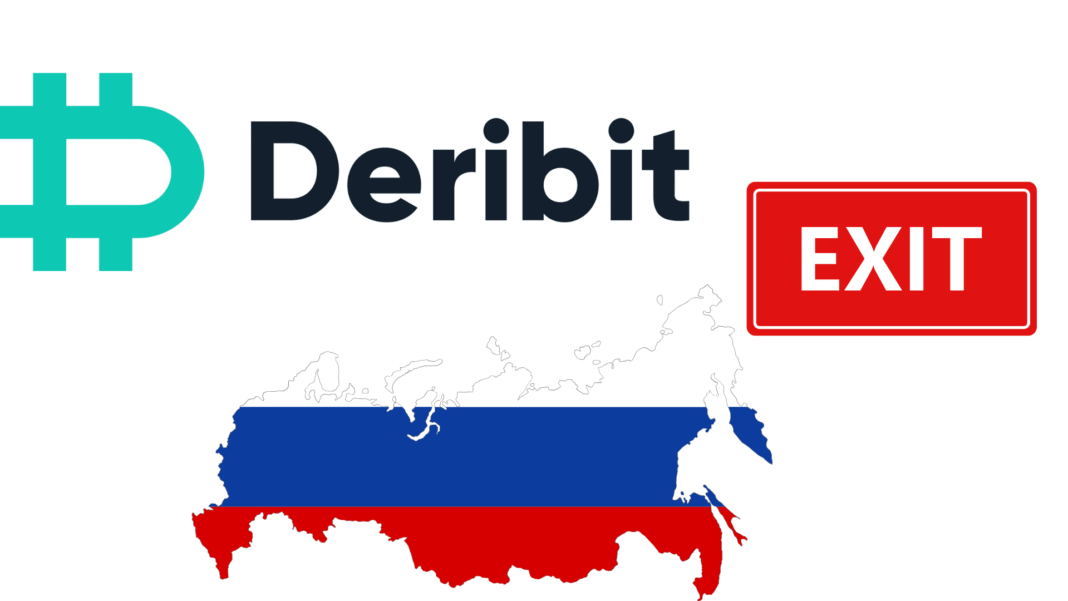Deribit, one of the world’s leading crypto derivatives exchanges, has announced its exit from Russia due to European Union (EU) sanctions. The exchange, in a statement posted on its website, confirmed that it can no longer accept Russian nationals or residents as clients unless they qualify for specific exemptions.
“Due to EU sanctions against Russia, Deribit is no longer able to accept Russian nationals and Russian residents as its clients unless an exception applies,” the exchange stated. “Since Deribit’s parent company is Dutch, these EU sanctions are relevant to us.”
Who Can Still Use Deribit?
While the restrictions apply broadly to Russian users, Deribit has outlined a few exceptions. Russian nationals who are also citizens of a European Economic Area (EEA) country or Switzerland, or those who have permanent residency in these regions, can continue to use the exchange.
For example, a Russian national residing in Ireland or holding Danish citizenship can still trade on Deribit. However, Russians living in non-EEA countries, such as the UAE, are banned from using the exchange.
Additionally, Deribit has confirmed that no exceptions will be made for Russian companies, meaning business entities from Russia are fully restricted from accessing its platform.
What Happens to Russian Accounts?
Beginning February 17, 2025, Deribit will put Russian accounts on “reduce-only mode” in order to abide by the sanctions. This means affected traders will only be able to close existing positions or place orders that reduce their market exposure.
By March 29, 2025, all open positions held by Russian users will be forcibly closed. However, there will be no restrictions on withdrawing assets, allowing users to move their funds elsewhere before the final deadline.
Deribit’s Regulatory Challenges and Past Moves
Deribit has faced significant regulatory hurdles in recent years, leading to its relocation to Dubai in 2023. The exchange sought to establish itself in a more crypto-friendly jurisdiction, but despite this move, it is still bound by EU regulations due to its Dutch parent company.
Notably, even Russians living in Dubai are not allowed to use the platform, highlighting how strictly the exchange is enforcing these sanctions.
Beyond the Russian restrictions, Deribit has encountered additional challenges in recent months. In January 2025, reports surfaced that the exchange was considering a potential buyout by Kraken, another major crypto exchange.
Meanwhile, data suggests that Russian users are among Deribit’s largest customer base, ranking second in terms of overall user numbers.
Also Read: Deribit Unveils Hybrid Custody For Institutional Adoption Of Crypto Derivatives
Sanctions Could Hurt Deribit More Than Russian Crypto Users
Despite Russia’s growing interest in crypto, Deribit is not the dominant exchange among Russian traders, as other platforms attract a larger share of the market. However, losing Russian users could significantly impact Deribit, given the country’s strong presence on the platform.
At the same time, the crypto community in Russia may find ways to continue trading through DeFi solutions, which operate outside the reach of centralized institutions like Deribit.
The situation highlights the growing importance of decentralized platforms, especially in regions affected by financial restrictions.
How EU Crypto Regulations Are Reshaping the Market
The European Union has been tightening crypto regulations, significantly altering how exchanges operate. The Markets in Crypto-Assets (MiCA) framework, set to take full effect in 2025, introduces stricter compliance measures for crypto firms.
These regulations aim to increase transparency, reduce financial crime, and provide legal clarity. However, they also push companies like Deribit to make difficult decisions, such as restricting access to entire national populations.
As regulatory scrutiny increases, centralized exchanges may face more operational challenges, while DeFi platforms may gain popularity as alternative solutions for users impacted by regulatory barriers.
Deribit’s exit from Russia marks another significant shift in the global crypto landscape. While the exchange is complying with EU regulations, the move raises questions about how sanctions impact both businesses and users.
Also Read: Crypto Exchange Deribit Records 95% Rise in Trading Volume, Hitting $1.185 Trillion in 2024


